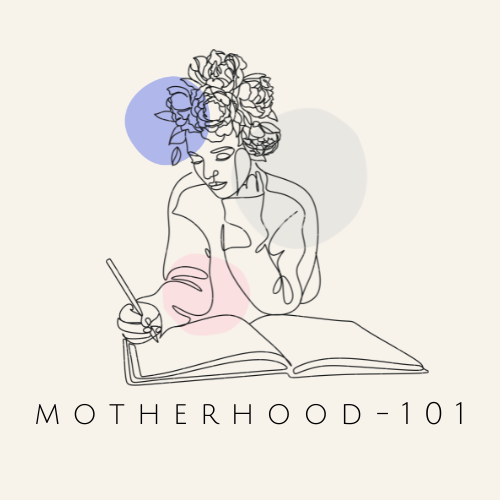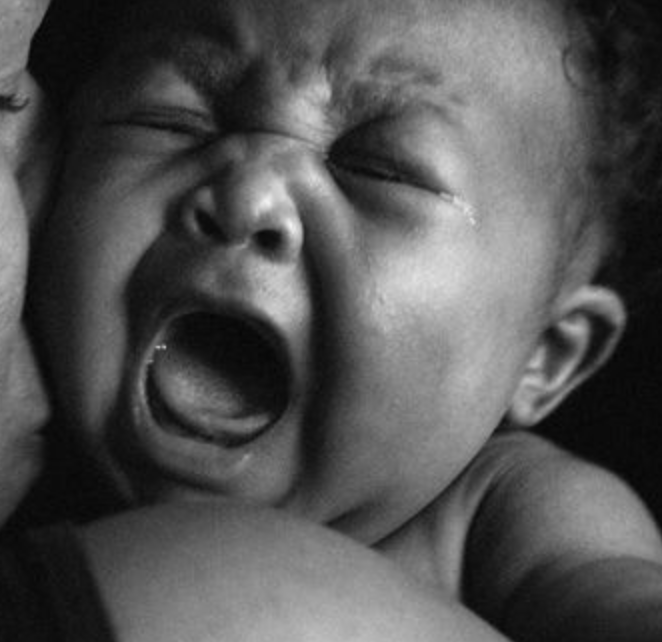I’d like to start this blog off with a question. And then dive into some answers that have been given by researchers and doctors. It almost seems like the answer is obvious, right? Babies cry because they want something. They don’t have a way of saying “hey, change me I’m wet” or “I’m hungry” without the use of whimpers and shrills. But have you ever thought about why other kinds of babies don’t cry. I’ve never known a kitten to yell for their mother’s milk or heard of baby gorillas wailing just to be held by their mothers. Yet, human babies time and time again use their full voice and tense their tiny bodies to get our attention. Why is that?
Dr. Harvey Karp, M.D., Pediatrician and Author, explains that a newborn’s cry is evolutionary, in his book The Happiest Baby on the Block: The New Way to Calm Crying and Help Your Baby Sleep Longer. Imagine you are a mother in the Stone Age and you’re busy foraging for food and your mate is out hunting. The only way your child can get your attention is to call for you. Note that human beings are at the top of the food chain. The implication of this statement is that human beings were able to protect their young so successfully that their children had the opportunity to cry loudly because they didn’t fear the threat of other predators. [It’s cool to think that your baby’s crying is their expression of confidence in your ability to protect them at all times!]
Ok so now we know why our babies cry. But how do we get them to stop. I think that’s what every sleep deprived parent wants to know. I’ve dived into this topic in nursing school, doula training, working on a labor and delivery unit, and most recently in studying for this blog. Here’s the summary of my knowledge thus far:
- EVERY BABY’S CRY IS UNIQUE
- YOU CAN’T SPOIL A BABY
- NOT A LOT OF SCIENCE BEHIND COLIC
- DON’T LET YOUR BABY “CRY IT OUT“
- BUT DON’T FEEL BAD TAKING A 10 MIN BREAK WHILE THEY CRY
#1 Each Baby’s Cry is Unique : Dr. T.B. Brazelton & Dr. Joshua Sparrow.
In Calming Your Fussy Baby the Brazelton Way, both Dr. Brazelton and Dr. Sparrow encourage readers to understand that your baby’s cry is unique. It is a touchpoint, a moment of learning and growth, in every parent’s journey when you can determine that your baby may whimper and furrow his eyebrows when he’s hungry versus when his diaper is wet. Being able to tell the difference is incredibly rewarding. While, it’s important to focus on your baby’s patterns to learn her personality, patterns, and behavior, there are also some general clues to figure out why she’s crying – see my upcoming blog titled Fix Your Face for more info on this.
#2 You Can’t Spoil Your Baby: Dr. T.B. Brazelton, Dr. Joshua Sparrow, & Dr. Harvey Karp
Most, if not all, baby experts believe that in the first 6 months of life spoiling a baby is not possible. Your goal as a parent is to reassure and give your baby consistent warmth, cuddles, and love. They need to know that you will come to them if they’re in distress. Your newborn is not manipulating you. They don’t know how. The most important thing at this stage is to be consistently there for them. Research has shown that children who “cried it out” have an increase in cortisol levels (stress hormone). Consistently letting your child cry it out not only sets them up for poorer psychological development but also stress related diseases and anxiety.
Once they get into 7 to 12 months, according to Dr. Joshua Sparrow, a baby’s brain is more advanced and can cry for attention in a manipulative way. So during this stage of development it is ok to teach your child not to cry just to get your attention. But try not to put too much pressure on yourself to figure out a “manipulative” cry from a “I need you” cry. The rule of thumb is if my baby is crying, pay attention.
#3 Not a lot of science behind colic
Colic, comes from the Greek word : koliko, which means large intestine or colon. The reason the term colic is associated with crying is because ancient Greek parents used to believe intestinal pain caused it. This theory continued , believe it or not, until the 1970s. In Western medicine, many practicioners taught medical students that gas and acid reflux (GERD) was the cause of incessant crying in newborns. So as a result, many providers prescribed sedatives, antispasmodics and encouraged mothers to give anti-gas drops during a crying episode to assist with releasing gas. The effect was tragic and ineffective. Infants went into comas and died as a result of taking these medications. And giving drops was almost as effective as feeding your baby water.
There are numerous theories out there to explain why colic exists. But here is what is known. Colic – shrieking crying that is not soothed by addressing hunger, discomfort, or boredom, starts at around 2 weeks, peaks at 6 weeks, and ends around the 3rd to 4 month. It usually occurs at night. It is not associated with a baby’s gender, race, ethnicity, weight, prematurity, or mom’s diet. It is not associated with a medical problem. It is what it is. Another interesting fact is that it doesn’t happen in every culture. For ways to soothe your baby… keep reading.
“Every human being has lived through this experience of being wholly embraced and protected by another human being and then somehow finds a way to adapt to an entirely new aspect of living – as if that’s easy. “
#4 Don’t Let Your Baby “Cry it Out”
This goes along with my former point : You Can’t Spoil Your Baby. Your newborn lived inside of your womb or your partner’s womb for 9 months! They lived in a cushy, consistently warm home with white noise, the sound of your voice and muffled sounds all around them. They were physically connected to you and shared everything you did for nearly 9 whole months. Your child is not used to this new world. They need to learn their environment and find consistency in your embrace.
#5 Don’t Feel Bad Taking a Break
While your baby is in a new environment and needs your comfort and embrace to feel safe enough to adjust, you too need to not feel bad letting them do that. Listen, I’m all for women holding their babies right snuggled up to their breasts 24/7, but you also need to care for your body. Taking a 10 minute shower or using the bathroom while your baby cries, is ok. *Remember, this comes from the experts, not me. But if you don’t feel comfortable with that, have a friend or family member, or doula come over to hold your baby while you take the necessary time to unwind.
“If we only had more time. The Fourth Trimester”
According to Dr. Karp, all babies are born three months too soon. Their brains pack just the important stuff before leaving their homes. The only things to go with them are: methods to regulate their body, innate reflexes, some muscle and sensory control, and an ability to focus their attention (a.k.a state control). Everything else is learned out in the real world. So they have a HUGE learning curve. They need to learn to self soothe; and you need to help them. If you don’t know how or where to start – check out this short video below on “The Cuddle Cure.” As always thank you for visiting my site. Happy Parenting.


Leave a comment